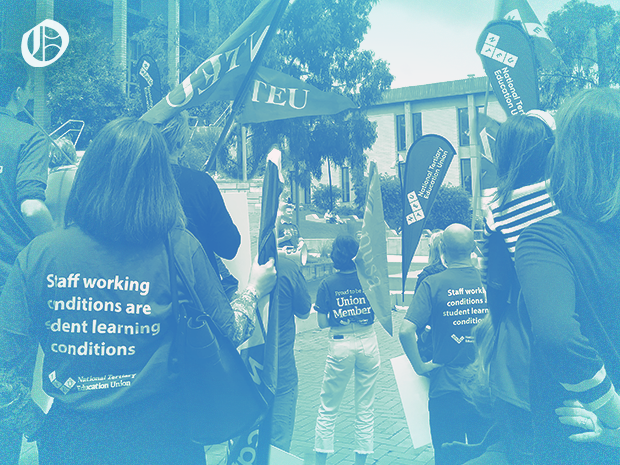ANU Staff Strike: Everything You Need to Know

By Ryan Bourke, Graphic by Will Novak.
On Thursday the 27th of July, ANU staff who are members of the NTEU will go on a half-day strike following their vote to do so last semester. In the lead up to Thursday’s strike, Observer has the answers to your questions about why the strike is taking place, how it is likely to affect your first week of classes, and the likelihood of further strikes in early August.
What is the NTEU?
The National Tertiary Education Union (NTEU) is a trade union whose membership consists of educators working in Australian universities. In addition to advocating for better wages and job security for its members, the union also advocates for stronger government support and funding of universities, and the protection of academic freedom. Like any union, the NTEU also advocates for its members on an individual level by providing legal assistance to members who have had their working rights violated by the institution they are employed by.
Why are ANU staff striking?
The NTEU voted to strike in response to the ANU’s failure to make several key concessions relating to wage rises. This stemmed from the NTEU’s recent bargaining with the university which has now been ongoing for over a year. The strike also comes amidst the union’s demands for more flexibility, less casualisation, and healthier workloads for staff. The Union told Observer that it was demanding the greater of a 15% pay rise over the next three years or an agreement in which wages rise in line with the CPI plus 1.5%. For more information on the NTEU’s grievances with ANU, be sure to check out this article from May in which Observer interviewed union leaders about the impacts casualisation and stagnating wages are having on educators amidst rising inflation and the ongoing cost of living crisis.

Source: Twitter / @NTEUACT
How will the strikes affect classes?
It is currently unclear which classes will be affected. However, because the strike is occuring in Week one/Bush Week as opposed to a more critical time of semester, interruptions are likely to be minimal. The strike will also not be picketed, meaning strikers will not seek to prevent staff members who are not part of the NTEU from attending work. However, the Union announced on Thursday that it has given notice for a second, more severe 48-hour strike on the 7th and 8th of August, which will proceed if ANU fails to concede to their demands. Students are encouraged by the NTEU to join their educators in solidarity at Thursday’s strike.
How has the ANU responded?
ANU has not accepted the NTEU’s proposed rise in wages and instead made a counter offer of a 17% increase over 4 years. This offer has not satisfied the union, which claims that this figure includes a 3.5% pay rise that was already conceded last year, and would only constitute a real increase of 3.2% over the next three years. NTEU ANU branch president Millan Pintos-Lopez told media outlets in late June that the strike would proceed unless ANU makes a higher pay offer and further measures regarding job security, especially for casual staff.
Written by Ryan Bourke, graphic by Will Novak.
_____________________________________________________________________________________________________________________________________________________
Know something we don’t know? Email [email protected] or use our anonymous tip submission.
If you have an issue with this article, or a correction to make, you can contact us at [email protected], submit a formal dispute, or angry react the Facebook post.
Want to get involved? You can write articles, photograph, livestream or do web support. We’re also looking for someone to yell “extra!” outside Davey Lodge at 1AM. Apply today!









